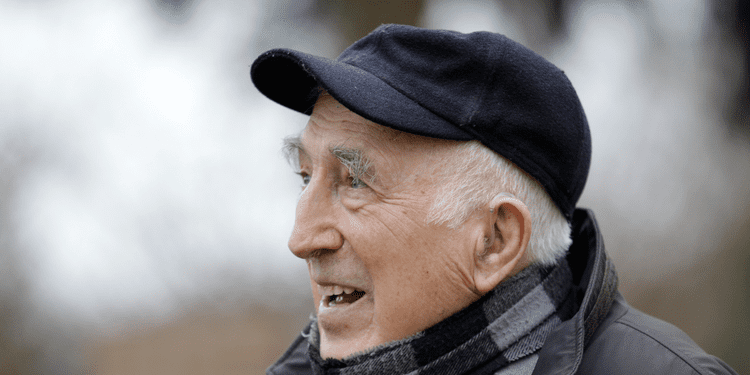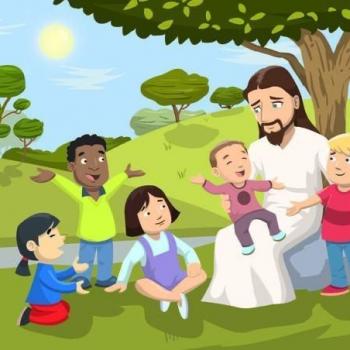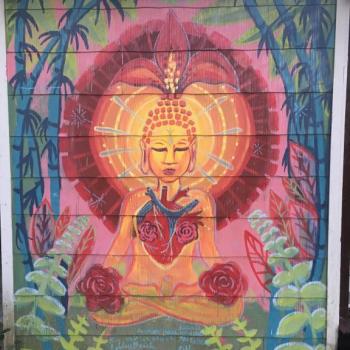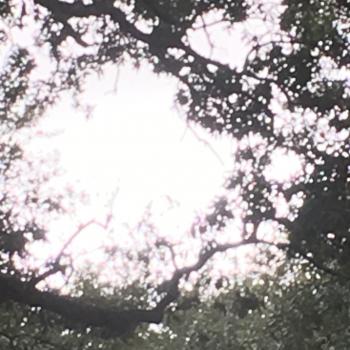 Like so many others, my heart was ripped open this past weekend when I learned the news of Jean Vanier’s sexual abuse of half a dozen women. Vanier was a Catholic mystic who wrote incredibly beautiful words and started an incredibly beautiful movement that honored the dignity of mentally disabled people. And he was a sexual predator. There’s a very specific lesson that I was given to learn from this story. I am absolutely not saying this is the one take everyone should have. It’s just how God is confronting my own inner darkness right now as a mystical spiritual teacher who fears what I am capable of.
Like so many others, my heart was ripped open this past weekend when I learned the news of Jean Vanier’s sexual abuse of half a dozen women. Vanier was a Catholic mystic who wrote incredibly beautiful words and started an incredibly beautiful movement that honored the dignity of mentally disabled people. And he was a sexual predator. There’s a very specific lesson that I was given to learn from this story. I am absolutely not saying this is the one take everyone should have. It’s just how God is confronting my own inner darkness right now as a mystical spiritual teacher who fears what I am capable of.
Vanier was an important mentor to Henri Nouwen, who wrote the book Life of the Beloved that completely changed the way I understood the Christian gospel and was my primary gateway into mystical spirituality in which I have learned to seek and surrender to what Nouwen calls “the inner voice of love.” So the question I’m screaming at God right now is this: Why didn’t your “inner voice of love” stop Vanier from doing what he did? And is there something endemically toxic in a theology that is so affirming it can no longer deny anything? I believe very much in the notion that a tree is judged by its fruit, so to discover rotten fruit in a tree that has given me so much life is existentially catastrophic.
I have not read much of Vanier’s work directly, but I’ve seen enough to sense that his spirit is reflected in the words that Nouwen writes about the yes that God has to say to all of us. That yes is so important, so infinitely comforting, and so easily misunderstood. The grave danger is that we come to trust our intuition, vulnerability, and sincerity absolutely. I know that Jean Vanier carried with him whatever toxic masculinity made him think it was okay to manipulate women who were his subordinates into satisfying his sexual needs. But the way that these women described his rationalizations of his deeds makes it clear that Vanier’s mysticism was a centerpiece of his thought process, and that scares the hell out of me as a mystic.
1 Corinthian 2:15 is a very important and dangerous verse. The great mystic apostle Paul writes: “Those who are spiritual discern all things, and they are themselves subject to no one else’s scrutiny.” It is true that the deeper we go on the mystical path, the more we are able to see complex paradoxes and ways that seemingly immoral behavior can be highly moral from a different perspective. Nothing is as straightforward as it seems the more we travel into non-dual reality. But we cannot trust our intuition, vulnerability, and sincerity absolutely, because when we think we’re beyond conventional good and evil, “moral legalism,” etc, we become capable of great harm.
I have harmed people whom I was given to protect and nurture as a pastor because my own emotional needs and wounds got channeled in a toxic way in our relationship. I have several former students who may not go to church again, partly because of how I acted out after a tragedy in our community. My harm doesn’t disappear, even though I learned important lessons, sought forgiveness, repented, and changed. The most haunting realization is that I wasn’t just mischanneling my emotions; I actually deceived myself into thinking that what I was doing was pastoral.
When I read the description of Vanier telling these women they could make love to him not as Jean Vanier but as Jesus, it shattered me so deeply as someone who adores the fiercely erotic love that mystics like St. John of the Cross and Teresa of Avila show for Jesus as well as the conviction that Jesus is indeed present in all of us (and thus could be said, in some sense, to make love to us when we are sexually intimate). Vanier’s story also retriggers my wounds as someone molested by a church leader who presumably thought that he was being a mentor to me in his own broken, confused way.
As a mystic, I believe that people are put in my path for a reason and I often feel powerful feelings towards those who come into my life in a seemingly “epic” way. I have rich and intense relationships with a number of people I have adopted as my spiritual family. Some are older; some are younger; some are physically attractive to me; some I perceive with entirely fraternal eyes. There are very harmful things I could justify doing, and I could convince myself it was a gift I was offering to affirm the other person rather than manipulative abuse to serve my own longings.
The reason that I have not done what Jean Vanier did is not because he is in a different category of human than me. It’s not because my intuitions are better than his. It’s because I have friends whom I can be brutally honest with and who hold me accountable for the boundaries I need to set to honor the covenants that define my life as a Christian, husband, father, pastor, counselor, and teacher. These friends have been my anchors. God is constantly correcting my intuitions through their guidance.
Those of us who walk a mystical path can be a gift to others, but we have to be anchored and accountable to the cloud of witnesses that God has put into our lives, both living and dead. I continue to seek guidance from my grandfather who lives eternally with Jesus, and I also have a great twelve step sponsor, a wise therapist, loving and generous parents who never stop growing wiser, a courageous sister, a wife who loves and affirms my weirdness, two sons who anchor me by needing me to anchor them, and so many adopted parents and siblings whom God uses to teach me.
So much of life is learning how to dance, how to navigate the synergies and rhythms that emerge between people. Having intentional, clarifying conversations when they’re needed. Respecting cues that are given when others do things like pull away from a hug that lasted a few seconds too long. Knowing that I am always playing a role in the life of whoever dances with or around me that often has little correspondence to my internal experience. I can take responsibility for studying the signals I receive to avoid becoming part of another person’s lifelong recurring patterns of trauma.
We cannot just “go with the flow” without responsibility and intention. We cannot just “love the one we’re with” because it feels right and some bullshit about energies and auras. I’m not saying that to judge spontaneous, intimate encounters as such. I’m just saying that we should always dance with intention and responsibility.
The anarchist book Joyful Militancy that I’ve been reading points out that responsibility is really responsiveness. Being tuned in enough to your fellow dancers’ needs and feelings that you never turn them into objects for your own satisfaction and remembering your responsibilities to everyone else in your life at the same time. Leaving the right amount of space, adjusting where and how you move, always staying attuned and alert. Responsibility is a dynamic reality that is under continuous renegotiation. Pretending that we can simply stoicize ourselves with rigid moral principles can ironically create the condition where harmful irresponsibility becomes easier to rationalize.
When we dance well, we can create beautiful, life-changing moments of intimacy with people that do not always have to become what Shakespeare called “the beast with two backs.” That isn’t the only way to be touched eternally by another human. Again, I say this not to judge anybody else’s sexual interactions, but to confess the way that my own intuition about the intimacy I want to offer others is always in need of refinement and careful attentiveness. I can love deeply and intimately without leaping into bed with someone who isn’t my wife.
As a pastor, I so badly want to shower people with love and I so badly need to accept that this love must always operate within the dance of consent and the boundaries of covenants that I have made. I’m not just talking about physical touch, but every aspect of emotional connection. I am responsible for navigating the synergies that emerge with other people in such a way that I do not harm my marriage, my family, and my sacred vocation. I am responsible for balancing how I spend my time and how I invest my energy.
Reading the story about Vanier’s dark truth was one of the biggest two by fours God has ever smacked me in the face with. Vanier’s tragic failure as a sexual predator is now part of what we learn from him alongside the vision that remains beautiful for the L’Arche community and the truths that are still true about vulnerable humanity.
I respect that many abuse survivors simply have to “cancel” Vanier now. But for those of us who have roles where we could potentially cause harm like he caused, canceling him too quickly might be a way of avoiding what we need to face. We need to let his sin call us out and bring our darkness into the light, so that we can change and do better.
I believe that God is embracing Jean Vanier right now, saying yes to the beauty within him and emphatically saying no to his sin, in some mysterious compassionate rage of eternal fire that is always both love and truth. I do not know how God will make eternity safe for the victims of Jean Vanier if they have to face him again, but I trust that God will center their needs for healing and safety in whatever restoration Jesus makes possible. It is only recently that I told God I could face my childhood abuser in heaven if I see him there. I don’t think anyone has the right to promote that as an expectation for any survivor. I just have a general conviction that this is the kind of impossible healing and reconciliation that Jesus died to do something about.
As a mystic, I have to constantly remind myself that I am not God; I am a temple where God’s Spirit resides; I am part of a beautiful body of people who share Christ’s wisdom collectively. And if I listen humbly to all my teachers and fellow pilgrims while seeking continually to hand my will over to God, then God will protect me from my darkest intuitions.
One final word: for those of you have been victimized by spiritual leaders, whatever form the abuse took, I am so sorry that we hurt you. I repent and I pray that we will learn and change.
















